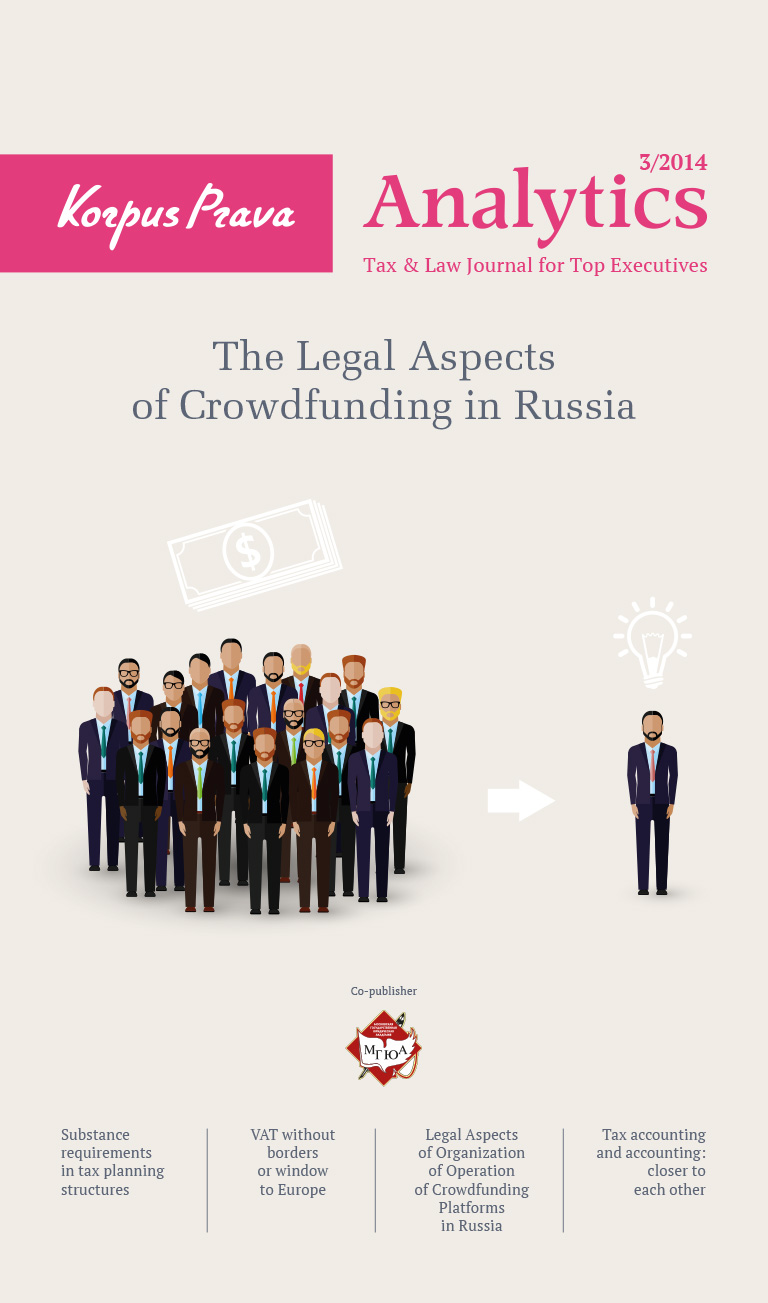- Cyprus Citizenship Scheme for Foreign Investors
- Squeezed But Pleased: Taxation of Passive Income in the European Union
- VAT Without Borders or Window to Europe
- Legal Aspects of Organization of Operation of Crowdfunding Platforms in Russia
- Substance Requirements in Tax Planning Structures
- “Deposit Splitting” of Individuals. Legal Civil and Criminal Aspects
Live Wires in the Family Enterprise
As practitioners, we all know the situation: we arrive at the scene and are presented with the situation. Like a detective or journalist, we investigate what happened. Usually, when families are involved, it is after the event. Porcelain has been shattered. Electrical current has electrocuted people. And now, what do we do?
Let us look at an example.
Henry M., a successful entrepreneur, has built a sizeable business generating millions in profit. But as luck would have it, he is diagnosed with Alzheimer’s. While he had at times thought about the uncertain future, did he envisage the onset of such a debilitating situation so soon? No. Did he find the successors to lead his tremendously profitable firm? No. And now, as always, it is getting late. Darkness sets in. His three grown children, an engineer, a financial accountant and a lawyer, stand ready to take action. So does his wife, who stood shoulder to shoulder with Henry in building the family firm.
But there is also his management, who wish to have a share in the business. They too have worked diligently for decades, by Henry’s side. Now the usual dance begins. Do we keep the management in place, do we replace the management with the second generation, and if so, who does what? The question of governance has not been thought of. Wires have criss-crossed; the family is prone to misunderstandings. Seemingly trivial queries spark bigger firestorms. If the firstborn son, Adam the engineer, takes the helm, can he and his young family use the family plane to fly to Mallorca for holidays? And how much remains for the other siblings and the wife?
At this moment, as practitioners, we can only wish that we had been called in earlier. Surely a functional set-up could have been lined up in advance. We could have helped Henry in good times to prepare for such an incident and prepare a power grid, where the electrical current actually propels the business forward instead of causing ripples and negative currents to the remaining family members, in times of crises?
With Henry on the sick bed, it is now getting too hot to handle. With family vs management the tension is palpating.
Another curve ball comes in when the daughter who is a financial accountant and has married a leading CPA, suggests to manage the books with her husband to provide the steady hand that the family business may require. It is not only the management which may beg to disagree but also within the siblings, the sibling rivalry could ensure. This would be a testy situation since in-laws were usually kept at arm’s length in the past. There was enough confusion when family members wanted to work in the firm, and how their performance was to be assessed and by whom, and how they were to be compensated? Imagine now an in-law wading into that wave pool. There are innumerable potential crossed wires that can stop the flow of the positive current. The youngest lawyer progeny could stake a better professional claim and managing affairs in such crises as well.
As practitioners, we see a lot of problems coming in from such governance issues. Who is allowed to have access to corporate assets such as cars, houses and planes? And how often, and over the weekend? Those who don’t work in the family business sometimes want to be paid out higher levels of dividends, those in the firm might wish to retain profits to support future corporate projects. All these items require a mutual understanding and constant dialogue. With Henry on the sick bed, the ineffective system of communication and decision making is getting augmented into the open.
A very electrifying suggestion doing the rounds these days is that parents should not shy away from spending their children’s inheritance. First of all it’s fun for the parents, and secondly it definitely emancipates the children, possibly allowing them to become self-reliant. One could compare it to enabling the children to have their own power house, instead of connecting to the parents’. This is an attitude shared by some of the wealthiest people on this planet. We don’t know about measures in place to soothe conflict in these wealthy families but we can presume that there is greater probability of conflict. As soon as the spark of disagreement flies, family members maybe severely burnt. So preventing fire is so much better than fighting fire!
According to a study undertaken by PWC, more than half of their family business clients have argued about the future direction of the firm. Without an established dialogue culture there will be trenches between family members and even family groups.
Let’s take a step back as to what we could have helped with in the ideal scenario.
It all starts with the founder’s entrepreneurial values – that are intrinsic to the entrepreneur and his family. Whether he is furthering young talents, or puts himself first, or puts his family first – all of this could have been enshrined from the beginning and the whole family and management would know what the values of the patriarch and the family are.
If the founder is a philanthropist, we could have helped him put his money to good use in his lifetime. If he was more into personal materialistic wealth, his vintage car or art collections, horses, or other luxuries such as yachts and aeroplanes – would still do well with an ownership structure.
In well-organised families the wealth owner takes it upon him to educate the next generations. The next generations need to be re-wired to connect to the power house of the first generation, or simply the preceding generation. They might be included early on and work in the family business, and thus inspired to carry the torch. Or they might be entrusted with philanthropy and running the family foundation, selecting appropriate projects to invest in to achieve the purpose of the foundation.
In not so well-organised families, the practioners could be the ideal blessing. We could coach the founder as to how to explain the wealth and its implications to his wife and family. How to explain and teach them how to run an enterprise, how to keep the wealth together, and how to work together for a mutually shared vision or goal? Such a vision is the ultimate goal, where the family wishes to go. It’s certainly the centre of gravity. It is the generator of power, even in unstable times when the family needs to adapt to external changes.
Sibling rivalry can be mitigated by getting the children involved in the family business from an early age so that they grow up with the family values, the family ethics code, the DNA. Alternatively, the creation of a family council with regular, minuted meetings can create a sense of involvement and belonging for all ages and roles.
Conflict resolution is always family-specific. Some like to have a family council. Others prefer a family forum. There is also the possibility that the shareholders’ general assembly can be a forum or council. In my practice, governance does play a role – although seldom do families, especially not first-generation families, want to write up and integrate it into a family constitution.
What has worked in the past is the inclusion of a place of arbitration in the event of internal conflict within a family. This can be prepared by strictly separating family business from family life, i.e. relationships should not be influenced by issues or discontent in the family business. In our experience, this is more difficult to achieve in family businesses of the first or second generation. It can become easier later on when not so many family members work directly in the family firm.
Probably the most successful way to resolve family business issues is to escalate to a mutually agreed third party, who should be benign but impartial – a person of respect and integrity. Such roles can be created unbeknownst to the holder of such a privileged position. It could be an uncle, it could be the family financial director, the CFO or a former CEO. Or it could be a trusted advisor: a trustee, a lawyer or indeed a trusted banker.
To return to Henry’s case, during the “good times” he would have taught his wife and children how to build connections with each other as well as the management and prepared the grid where communication flow was solid. He would have shared his vision of how he would deal with the future. In order to safeguard the power house, the family has to understand electrical tensions roast everyone in sight. Understand how to distribute wealth amongst the family – which child would be at the helm of which division of the firm, which should include the family foundation and philanthropy. Henry would have had time to do so. It falls to the advisors to create awareness of the pitfalls of not doing so, and how to organise the firm and wealth so that his wife and children can enjoy the fruit from the trees planted by Henry. It might be useful to explain this to Henry while he is still enjoying the good life.
Your subscription to our journal will definitely boost the efficiency of your specialists and downsize your expenses for consultants.
The journal is available free of charge in the electronic version.
Free Download

